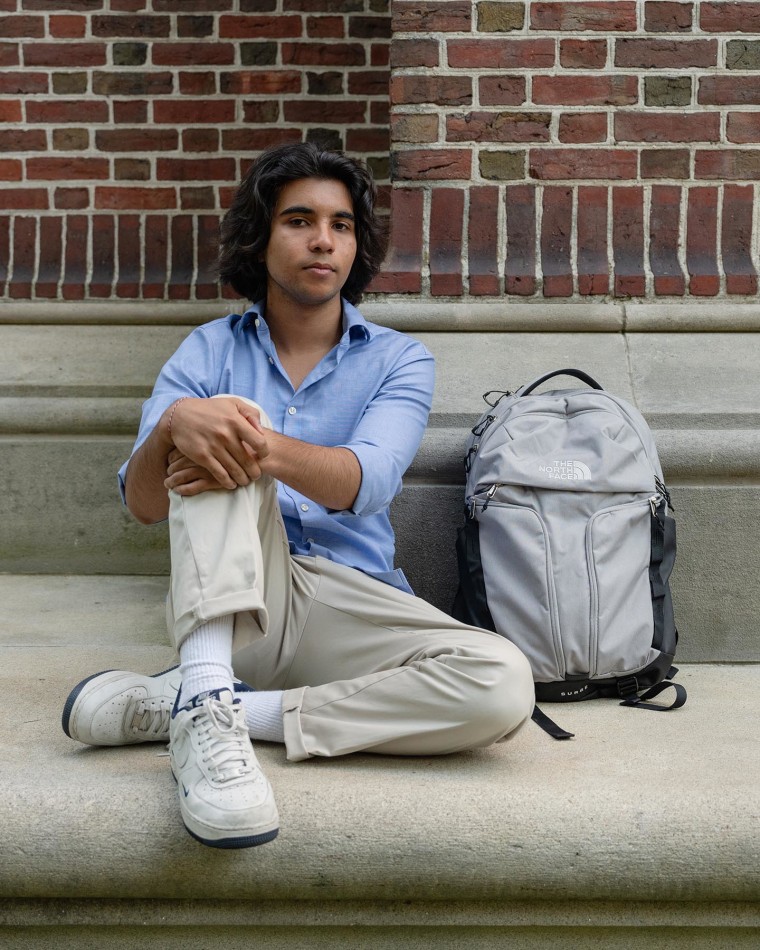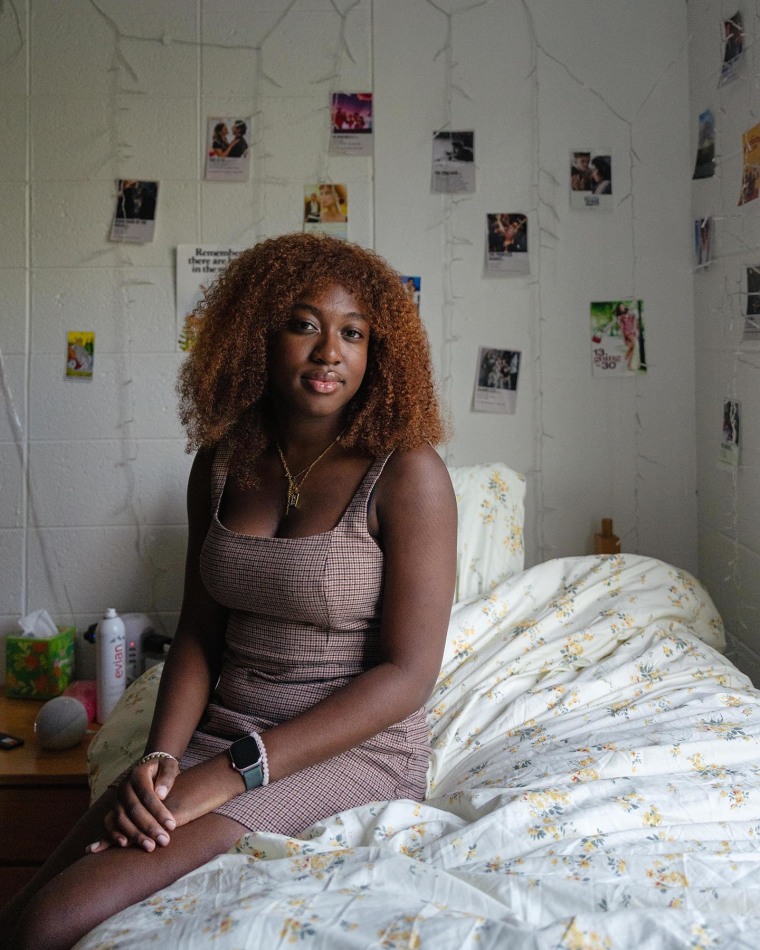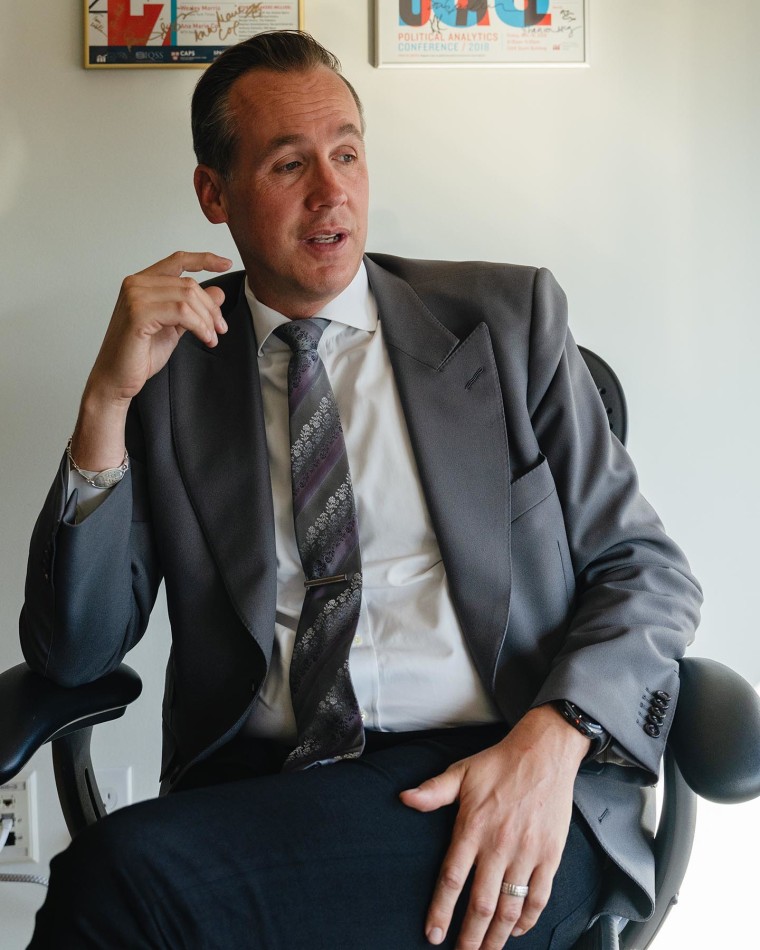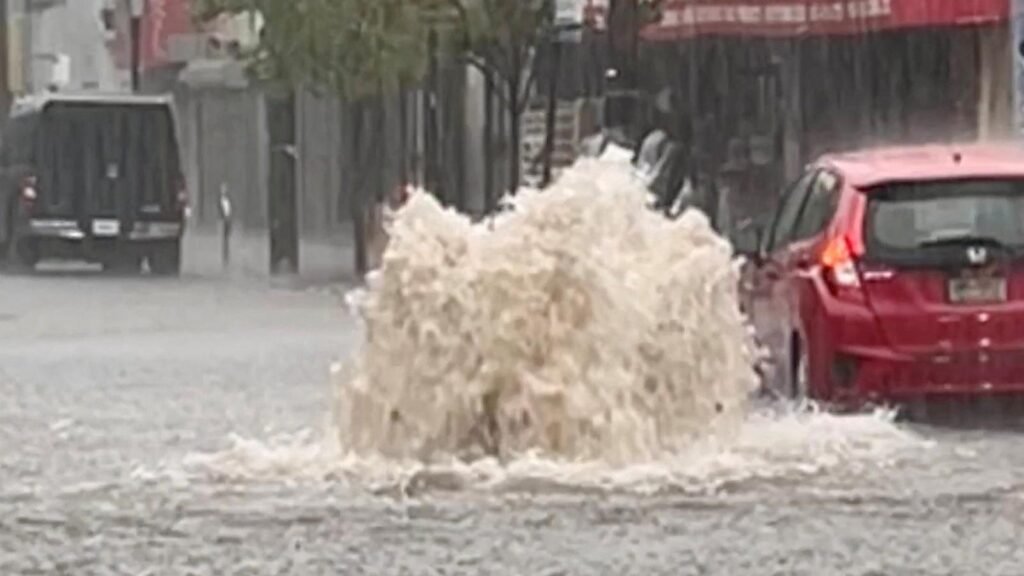After months of back and forth during which the Trump administration slashed funding over accusations of antisemitism and Harvard took legal action, a judge ordered the government last week to restore the funding. The administration said it will appeal.
Still, the ruling sends a powerful message, says Vera Eidelman, a senior staff attorney with the American Civil Liberties Union’s Speech, Privacy, and Technology Project.
“The government can’t punish speakers, including private institutions, including academic institutions, for disagreeing with its worldview and being unwilling to succumb to its ideological bullying,” Eidelman said of the order.
It’s against this tug-of-war that staff members and students find themselves concerned about free speech. And they have a broad range of beliefs.
Many students expect a more cautious campus, with international students in a particularly precarious spot
Of the more than half dozen students NBC talked to, some felt that the school would remain a safe space for debate and free speech. However, almost all pointed to a major concern over international students.
While this group would typically ask at orientation for standard guidance on the school’s courses, this year’s international students were asking pointed questions about what to do if they’re stopped by ICE, said student body co-president Abdullah Shahid Sial. He’s from Pakistan and was helping international freshmen get acclimated with campus life.

“Usually the questions I get from them are, ‘What are the best classes to take? Who are the right professors to learn from?’” Sial said. “This time around literally 80% the questions were, ‘What do we do if we’re stopped by immigration? Who should we call if we’re detained? What do we do if someone shows up at our door?’”
Across the country, the Trump administration has targeted thousands of international students, revoking visas and terminating immigration status before courts stepped in. The administration appeared to take aim at students who participated in political activism or have criminal charges against them. At Harvard, the government made multiple attempts over the summer to curb the school’s ability to enroll international students. These attempts were blocked in court.
But Sial said that, as someone who’s been involved in campus protests and advocacy, his personal fears around deportation do not outweigh his duty to speak out.
“That’s something I’ve made complete mental peace with — that if worse comes to worst … I look at this time and I can very proudly tell my family, tell my kids that your dad stood for the right thing,” said Sial, who’s also a co-founder of Students for Freedom, a coalition that opposes the Trump administration’s attacks on higher education.
One sophomore from Malaysia, who requested anonymity out of fear of retaliation, said that he hoped to continue being vocal on campus, but he’s prepared for any developments. Already last semester, when rumors swirled that ICE agents were in the area, the students said he took precautions.
“I didn’t go to class that day. I had my friends bring me food,” he said. “I was just being hyper cautious.”
But Harvard students are creative, he said, and while many international scholars may not feel as though they’re able to be as visible as they once were, protest methods will likely evolve and self-expression won’t dim, he said. Methods will just change.

Jacqueline Metzger, a junior from Washington, D.C., said that she’s expecting many students to exercise more caution, even outside of the classroom. She cited the fact Harvard shuttered the spaces previously used for the school’s Women’s Center and Office for BGLTQ Student Life, reorganizing the staff into the Harvard Foundation, which supports programming that “showcases the wide spectrum of life experiences,” its website said. And that, Metzger said, spoke volumes about the preservation of safe spaces.
“There’s so many issues that come with being a woman on campus, let alone a woman of color, and just having that space where I could sit and talk and not feel like I have to police my words was really helpful for me,” Metzger said. “As we have these new classes coming into Harvard, that’s now going to set the tone for the next four years. These will be students who didn’t have those experiences.”
The closures, in addition to the quiet renaming of the diversity, equity and inclusion offices of several of its graduate schools, have made many students who spoke to NBC News doubtful that the school would protect them against threats from the Trump administration. Some saw the moves as a betrayal of the campus community and a small concession to the administration’s demands.

Enos said that the school has released guidelines, encouraging faculty to institute rules dictating that discussions do not leave the classroom. But that’s difficult to enforce and not a sufficient way to support students, Enos said. After numerous international students nationwide appeared to be targeted for deportation over their writings and beliefs, that fear has lingered with students, Enos said.
“I’d like to hear the Harvard administration say, ‘We are never going to let that happen to one of our students. We’re going to fight against that with everything we have if something like that would happen to our students,’” Enos said.
How a legal battle between Harvard and Trump built up over months
Months before students were finalizing their class schedules and shepherding freshmen into their new dorms, the Trump administration had already begun to clash with the institution in April when it froze $2.2 billion in grants in response to Harvard rejecting its list of demands that were aimed at allegedly addressing antisemitism on campus.
On the list from the government’s Task Force to Combat Anti-Semitism was restricting the acceptance of international students who are “hostile to the American values and institutions.” Another item that drew public backlash was the idea that a third party would audit programs that the Trump administration says “fuel antisemitic harassment or reflect ideological capture.”
Harvard then waged a legal battle, accusing the administration of “unprecedented and improper” control over the Ivy League institution. Weeks ago, the parties appeared to be in talks, inching closer to a settlement that would restore the lost funding. But not much has been revealed since.
After months of back and forth during which the Trump administration slashed funding over accusations of antisemitism and Harvard took legal action, a judge ordered the government last week to restore the funding. The administration said it will appeal. Still, the ruling sends a powerful message, says Vera Eidelman, a senior staff attorney with the American Civil Liberties Union’s Speech, Privacy, and Technology Project.“The government can’t punish speakers, including private institutions, including academic institutions, for disagreeing with its worldview and being unwilling to succumb to its ideological bullying,” Eidelman said of the order. It’s against this tug-of-war that staff members and students find themselves concerned about free speech. And they have a broad range of beliefs. Many students expect a more cautious campus, with international students in a particularly precarious spot Of the more than half dozen students NBC talked to, some felt that the school would remain a safe space for debate and free speech. However, almost all pointed to a major concern over international students. While this group would typically ask at orientation for standard guidance on the school’s courses, this year’s international students were asking pointed questions about what to do if they’re stopped by ICE, said student body co-president Abdullah Shahid Sial. He’s from Pakistan and was helping international freshmen get acclimated with campus life. Abdullah Shahid Sial said international students have repeatedly asked him about precautions around ICE. Lucy Lu for NBC News / Lucy Lu for NBC News“Usually the questions I get from them are, ‘What are the best classes to take? Who are the right professors to learn from?’” Sial said. “This time around literally 80% the questions were, ‘What do we do if we’re stopped by immigration? Who should we call if we’re detained? What do we do if someone shows up at our door?’” Across the country, the Trump administration has targeted thousands of international students, revoking visas and terminating immigration status before courts stepped in. The administration appeared to take aim at students who participated in political activism or have criminal charges against them. At Harvard, the government made multiple attempts over the summer to curb the school’s ability to enroll international students. These attempts were blocked in court. But Sial said that, as someone who’s been involved in campus protests and advocacy, his personal fears around deportation do not outweigh his duty to speak out. “That’s something I’ve made complete mental peace with — that if worse comes to worst … I look at this time and I can very proudly tell my family, tell my kids that your dad stood for the right thing,” said Sial, who’s also a co-founder of Students for Freedom, a coalition that opposes the Trump administration’s attacks on higher education. One sophomore from Malaysia, who requested anonymity out of fear of retaliation, said that he hoped to continue being vocal on campus, but he’s prepared for any developments. Already last semester, when rumors swirled that ICE agents were in the area, the students said he took precautions. “I didn’t go to class that day. I had my friends bring me food,” he said. “I was just being hyper cautious.” But Harvard students are creative, he said, and while many international scholars may not feel as though they’re able to be as visible as they once were, protest methods will likely evolve and self-expression won’t dim, he said. Methods will just change. Jacqueline Metzger, a junior, said she feels loss over the shuttering of a dedicated space for the school’s women’s center.Lucy Lu for NBC NewsJacqueline Metzger, a junior from Washington, D.C., said that she’s expecting many students to exercise more caution, even outside of the classroom. She cited the fact Harvard shuttered the spaces previously used for the school’s Women’s Center and Office for BGLTQ Student Life, reorganizing the staff into the Harvard Foundation, which supports programming that “showcases the wide spectrum of life experiences,” its website said. And that, Metzger said, spoke volumes about the preservation of safe spaces. “There’s so many issues that come with being a woman on campus, let alone a woman of color, and just having that space where I could sit and talk and not feel like I have to police my words was really helpful for me,” Metzger said. “As we have these new classes coming into Harvard, that’s now going to set the tone for the next four years. These will be students who didn’t have those experiences.” The closures, in addition to the quiet renaming of the diversity, equity and inclusion offices of several of its graduate schools, have made many students who spoke to NBC News doubtful that the school would protect them against threats from the Trump administration. Some saw the moves as a betrayal of the campus community and a small concession to the administration’s demands. Harvard professor and political scientist Ryan Enos is concerned about students’ potentially self-censoring. Lucy Lu for NBC NewsEnos said that the school has released guidelines, encouraging faculty to institute rules dictating that discussions do not leave the classroom. But that’s difficult to enforce and not a sufficient way to support students, Enos said. After numerous international students nationwide appeared to be targeted for deportation over their writings and beliefs, that fear has lingered with students, Enos said. “I’d like to hear the Harvard administration say, ‘We are never going to let that happen to one of our students. We’re going to fight against that with everything we have if something like that would happen to our students,’” Enos said. How a legal battle between Harvard and Trump built up over monthsMonths before students were finalizing their class schedules and shepherding freshmen into their new dorms, the Trump administration had already begun to clash with the institution in April when it froze $2.2 billion in grants in response to Harvard rejecting its list of demands that were aimed at allegedly addressing antisemitism on campus. On the list from the government’s Task Force to Combat Anti-Semitism was restricting the acceptance of international students who are “hostile to the American values and institutions.” Another item that drew public backlash was the idea that a third party would audit programs that the Trump administration says “fuel antisemitic harassment or reflect ideological capture.” Harvard then waged a legal battle, accusing the administration of “unprecedented and improper” control over the Ivy League institution. Weeks ago, the parties appeared to be in talks, inching closer to a settlement that would restore the lost funding. But not much has been revealed since. Adblock test (Why?)
NBC News Top Stories



